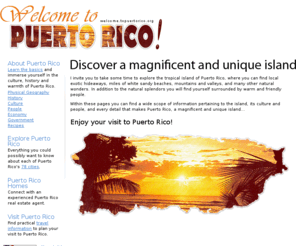Puerto Rico experiments with tax cuts

 California is experimenting with high taxes. Seventeen months after voters passed Proposition 30, which raised taxes $7 billion a year, California’s unemployment rate remains high at 8 percent, fourth worst in the country. While the government got the taxes to fund 4.5 percent raises for state government workers, the working middle-class got pink slips.
California is experimenting with high taxes. Seventeen months after voters passed Proposition 30, which raised taxes $7 billion a year, California’s unemployment rate remains high at 8 percent, fourth worst in the country. While the government got the taxes to fund 4.5 percent raises for state government workers, the working middle-class got pink slips.
But how would big tax cuts work? We’re soon going to find out in Puerto Rico. Neither an independent country nor a U.S. State, the Isle of Enchantment is a commonwealth. It has suffered high taxes and unemployment for years. Some recent news:
Puerto Rico is a U.S. territory, but its residents do not pay the federal income tax, except on income from sources outside of Puerto Rico. The New York Times reports that taxpayers need only live in Puerto Rico for 183 days out of the year on the island to be a resident.
The island has its own tax system outside of the federal code, but the territory has recently eliminated its taxes on interest and dividend income that used to stand at 33 percent, and has also cut its capital gains tax rate to zero.
It also has great weather — although watch out for hurricanes.
Crime is a problem in some areas. But it’s like that in some areas of California, too. You just have to know what to avoid.
Tax cuts
Casey Research just put up some info on Puerto Rico’s tax cuts:
The first thing readers should understand is that for Americans, this is truly a unique option and a tremendous opportunity for the right people.
Puerto Rico recently passed what are known as Act 22 and Act 20, or the Individual Investors Act and the Export Services Act.
The Individual Investors Act allows new residents of Puerto Rico to be completely exempted from Puerto Rican taxation on their capital gains, dividend, and interest income. And the Export Services Act provides for a top 4% tax rate on earnings from businesses that perform services—like professional consulting, asset management, research and development, computer programming, and so forth—in Puerto Rico for clients outside of Puerto Rico.
Before Puerto Rico’s new laws, it was immensely difficult for Americans to take advantage of incentives like these. For decades, programs in countries like Panama and Singapore sought to attract investors by providing tax breaks—but Americans couldn’t take advantage of them because US nonresident citizens are taxed on their worldwide income. The only exceptions have been in far smaller jurisdictions—never before in a country with the modern infrastructure and a deep labor pool that Puerto Rico offers….
For non-Americans, the differences are subtle—better infrastructure, more familiar goods from home, but no tax advantages. However, if you’re an American citizen, there’s all the difference in the world. This is because the US is the only country that effectively taxes its nonresident citizens on their income no matter where they live and no matter where they earn their money.
And you thought you lived in a free country.
Commonwealth
This means that while a Canadian could relocate to a place like the Cayman Islands and pay zero tax, an American could not. An American living in the Cayman Islands would still have to pay taxes to Uncle Sam. There was really no escape for Americans… until now….
Yes, that’s exactly right. This is where Puerto Rico comes in. Puerto Rico is an unincorporated territory of the US; it’s not quite a state and not quite a foreign country—it’s a commonwealth, which allows it to have a unique tax situation. Namely, Puerto Rican residents who derive their income from Puerto Rican sources do not pay taxes to the US government—they pay them to the Puerto Rican government. The same is true of the US Virgin Islands.
Combine this commonwealth status with the new tax incentives, and mainland US citizens have a window to legally lower some of the burdens of US taxation. There isn’t another jurisdiction in the world that offers such an opportunity for Americans. It’s like obtaining most of the tax benefits of renunciation without giving up your US passport….
There’s also the issue of Puerto Rico becoming the 51st state or its legal status otherwise changing. This would end the tax incentives. However, this issue has languished for decades; Puerto Ricans themselves are divided—some want statehood, some want the status quo, and others want complete independence. I think it is very unlikely that Puerto Rico’s current commonwealth status will change anytime soon.
How about California switching from being a state to a commonwealth? Then we, too, could avoid the massive U.S. tax ripoff.
We also would lose our U.S. Senators — Boxer and Feinstein — as well as congressional representation. But that would be a blessing for us and the rest of the country.
Related Articles
Republican lawmaker touts bill pushed by labor bullies
Feb. 21, 2013 By Chris Reed You don’t have to be a union hater to be amazed at all the
L.A. Times, Sac Bee: Political process success=real progress. Groan.
What defines the success of a state: the welfare and happiness of its people or its ability to pass a
Special interests could fil-A the Dems
August 3, 2012 Katy Grimes: Only hours after the Democratic National Committee announced that the 2012 platform would endorse same-sex



